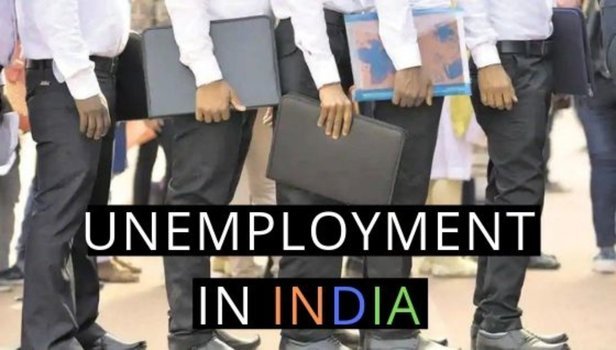Recession in India: Youth in India are facing the worst of job losses
03 Sep 2020 ( IBTN News Bureau )
According to data from the Center for Monitoring Indian Economy (CMIE), around 120 million people have lost their jobs since a month of lockdown in India. Most of the people are from the unorganized and rural areas.
Most of India's 400 million jobs are in the unorganized sector.
According to CMIE, during the lockdown, seven crore people who lost their jobs in the month of April have returned to work.
This has happened again due to the resumption of economic activities and good crop yields, because it has not only provided employment to the people on a large scale, but also has given additional work to people in the agricultural sector.
The National Level Job Guarantee Scheme has also helped in this, but this good news is limited here only.
According to CMIE's assessment, 1.9 million people lost their jobs during lockdown in the organized sector.
Another report by the International Labor Organization and the Asian Development Bank estimated that more than four million Indians under the age of 30 have lost their jobs due to the epidemic. People aged 15 to 24 years have been the most affected.
Mahesh Vyas, managing director of CMIE, says, "Most of the people under 30 are affected. Companies are hiring experienced people and young people are getting hit by it."
Many believe that this is the most worrying aspect of India's slowing economy.
Mahesh Vyas says, "Trainees and those working on probation have lost their jobs. Companies are not giving jobs on campus. There is no appointment of any kind. When the next batch of youth looking for work in 2021 will be graduates, they will join the army of unemployed."
Not giving jobs to newly graduated people will mean adverse effects on income, education and savings.
Mahesh Vyas says, "This will affect job seekers, their families and the economy."
The reduction in salary and sluggish demand will also negatively impact household income.
In last year's CMIE survey, it was found that about 35 percent people believed that their income has improved compared to last year whereas only two percent of the people believe this year.
There has been a reduction in income of people from lower class to upper middle class.
According to a report, the salaried people extracted nearly four billion dollars from their essential savings in the four months of the lockdown so that they can take care of the job cuts and salary cuts.
Mahesh Vyas says, "The decrease in income has been particularly hit by the middle class and the upper middle class."
Due to no job, more and more people are snatching business from their hands. But this is not a sudden change.
A study conducted in 2017 by economist Vinoj Abraham clearly revealed that this is probably the first time there has been such a steep decline in post-independence employment between 2013-14 and 2015-16. The study was based on data gathered from the Bureau of Labor.
Labor participation reflects the active workforce in the economy. According to CMIE, this labor participation fell from 46 per cent to 35 per cent after the demonetisation enacted on 8 November 2016. This affected India's economy very badly. Currently, the unemployment rate of the current 8 percent does not reveal the reality of this worsening situation.
Mahesh Vyas says, "This happens when searching for a job becomes useless because the job does not exist."
Economic insecurity has increased a lot in India.
Researchers Marianne Bertrand, Kaushik Krishnan and Heather Schofield have studied how Indians are tackling the challenges of lockdown?
These researchers have found in their study that only 66 percent of the households have more than two weeks of resources to cope with the economic crisis.
India's Finance Minister Nirmala Sitharaman has also said that the government does not deny going to jobs.
The number of new jobs has also fallen by 60 per cent in June compared to the monthly average of the previous financial year.
Last week Nirmala Sitharaman also said, "India is going through an unusual situation like a divine event ... during this time we can see a contraction in the economy."
The cases of corona infection in India are going to be close to 38 lakhs and the economy is stagnant. The scope for a complete recovery in the economy seems far-fetched. The economy of the unorganized sector is slowly picking up speed.
Those who had lost their jobs during the lockdown and who had returned to their villages, have now started returning to their places of work with the removal of the lockdown restrictions.
Some of these are also being given more money because those who hire them want to resume their business as soon as possible.
Labor Economist KR Shyam Sundar says, "With the economy opening by the end of this year, a lot of people will be returning to their jobs but those working on salaries will take time."
Service sector is not improving in India even in August, jobs are going away
India's service sector has seen a decline for the sixth consecutive month due to the interruption of business activity and reduced demand due to the Corona epidemic.
News agency Reuters citing an industry survey has reported that the continuation of jobs continues in August due to business activities being affected.
The survey says that after the economy has shrunk from April to June in the second quarter, it will take a long time to improve the service sector.
Shreya Patel, an economist at IHS Market, told news agency Reuters, "Business operating conditions remain challenging even in August in India's service sector. Lockdown restrictions in the domestic and foreign markets have had a severe impact on the industry.
In order to protect the economy from further damage, the government has given limited permission to open underground train networks, sports and religious events even in the face of rising cases of corona virus.
However, despite the easing of restrictions, it is believed that economic activities will take a long time to return to normal as people themselves are getting less out of the house and avoiding going to malls, cinema halls, restaurants and hotels.
Due to reduced demand at both domestic and foreign levels, production is decreasing and due to this, people are still losing their jobs.
(Click here for Android APP of IBTN. You can follow us on facebook and Twitter)
Share This News
About sharing
-
 19 Apr 2025
Meme warfare in Trump’s battle with Beijing
19 Apr 2025
Meme warfare in Trump’s battle with Beijing
Meme warfare in Trump’s battle with Beijing
Saturday, Apr ...
-
 10 Apr 2025
What is behind Trump's U-turn on tariffs?
10 Apr 2025
What is behind Trump's U-turn on tariffs?
What is behind Trump's U-turn on tariffs?
Thursday, Apr 10, ...
-
 29 Jan 2025
How will US tech firms react to DeepSeek?
29 Jan 2025
How will US tech firms react to DeepSeek?
How will US tech firms react to DeepSeek?
Wednesday, January 29,...
-
 26 Jun 2024
Kenyan President withdraws controversial finance bill after violent protests
26 Jun 2024
Kenyan President withdraws controversial finance bill after violent protests
Kenyan President withdraws controversial finance bill after violent protests
-
 06 Feb 2024
Dutch parent company sells Russian unit of Yandex, known as 'Google of Russia'
06 Feb 2024
Dutch parent company sells Russian unit of Yandex, known as 'Google of Russia'
Dutch parent company sells Russian unit of Yandex, known as 'Google of Russia&#...



